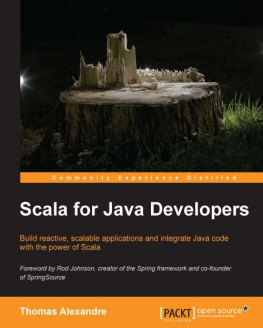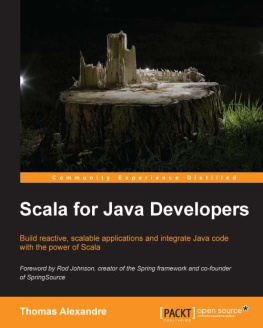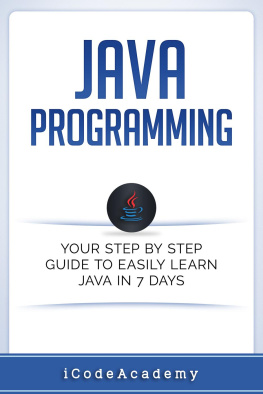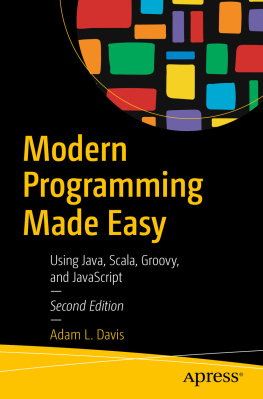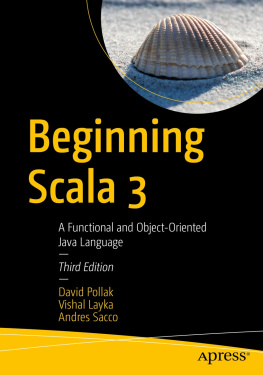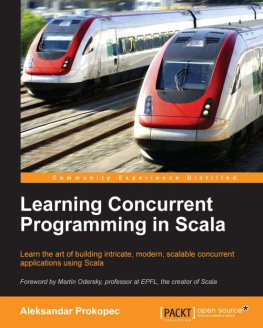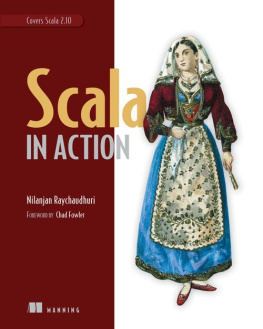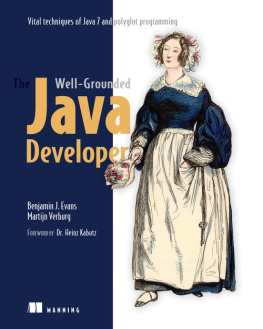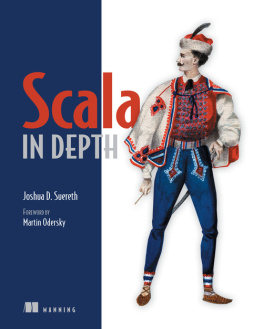Foreword
I wish this book had been available when I first started my own Scala journey.
As a Java developer, you must have heard a lot about Scala, even if you haven't yet written any Scala code. You must have noticed that Scala is becoming popular and heard vigorous debate about it. As I sat down to write this, I typed "scala is" into Google. The top completions included "scala is awesome", "scala is too complex", and "scala is hard." Understandably, you may be confused by such polarization. You may also have heard arcane, possibly off-putting details about obscure Scala idioms and advanced functional programming.
What you probably have not heard is a methodical, impartial attempt to answer questions such as "might Scala make me more productive in my daily work?", "will it be easy for me to pick up Scala?", and ultimately, "Should I switch from Java to Scala?".
Given the size of the Java community and the quality and ubiquity of the JVM, these are vital questions for many of us as developers and to our industry as a whole. Author Thomas Alexandre directly addresses them, presenting solid evidence in the form of working code. He shows that "Scala is awesome", if "awesome" means providing elegant solutions to common, real world problems. He shows that "Scala is not hard" by listing the straightforward steps to each of those solutions. He shows how Scala code is usually less complex than the familiar Java code to solve the same problem. He equips you to answer the question of whether you want to switch from Java to Scala.
The focus is on solving practical problem, and not on evangelizing language features for its own sake. Thomas explains core concept, such as functional programming, which may be relatively unfamiliar to Java developers, but his main emphasis is building on what the reader already knows. He does all this without a hint of the programming language chauvinism that often causes language debates to shed more heat than light.
The topics covered are all relevant to everyday Java development. Naturally, there is material that is purely Scala related, such as the coverage of REPL (the Scala interactive interpreter that has no Java equivalent). However throughout the book, the emphasis is on how to use Scala to provide better solutions to familiar problem, such as accessing relational data from Java. The coverage of Scala/Java integration is particularly welcome, as the topic seldom gets the attention it deserves. (In fact, Scala is so important partly because it does not force developers to abandon Java and the JVM). The material is up to date: for example, in its coverage of new but important technologies such as Typesafe Activator.
After reading this book, you will be ready to decide for yourself whether Scala is for you. Like Thomas and myself, you may well decide to program in Scala rather than Java when you have a choice. You will then be eager to learn more about functional programming and advanced Scala syntax, and you'll be ready for a more conceptual, reference-oriented book like Martin Odersky's Programming in Scala .
Thomas Alexandre provides the perfect starter to whet the appetite of Java developers for the rich main course that Scala has to offer. Bon appetit!
Rod Johnson
Creator of Spring framework
Co-founder of SpringSource
About the Author
Thomas Alexandre is a senior consultant at DevCode, specializing in Java and Scala software development. He is passionate about technology, enthusiastic about sharing knowledge, and is always looking for ways to code more effectively through the adoption of new open source software and standards. In addition to 15 years of Java development, he has focused these past few years on emerging languages and web frameworks such as Groovy and Scala. He also has a Ph.D. in Computer Science from the University of Lille, France, and has spent two years as a postdoc with Carnegie Mellon University in the fields of Security and E-commerce.
Thomas is a certified trainer by Typesafe, the creators of Scala.
Acknowledgments
There are many people who have contributed to this book in one form or another and I would like to thank them for their help.
First, I would like to thank Martin Odersky, the creator of Scala and co-founder of Typesafe for inspiring me through his fantastic lectures and two online courses to write this book. The online courses were written together with Erik Meijer and Roland Kuhn who are also to be thanked. I am also grateful to many Typesafe employees as well as Zengularity for creating and enhancing such amazing technologies. In particular, I would like to thank Viktor Klang and Jonas Bonr for their numerous tweets with links to great reading material and conference talks. Thanks to Heiko Seeberger and Trond Bjerkestrand for certifying me as a Typesafe Trainer for their Fast Track to Scala course.
A big thank you to the very active Scala Community for all their contributions in terms of open source projects, talks at user groups, and workshops. The meetups at the Stockholm Scala User Group have been a good source of inspiration as well, thanks.
The team at Packt Publishing has been very helpful and has done a great job at all levels in reviewing and producing this book. In particular, I would like to thank Akash Poojary, Neha Nagwekar, Neil Alexander, Miloni Dutia, Kunal Gaikwad, Mukul Pawar, Kunal Parikh, Rubal Kaur, Apeksha Chitnis, Larissa Pinto, Tomer Gabel, Steve Perkins, Eric Le Goff, and Sumeet Sawant for their extensive participation.

